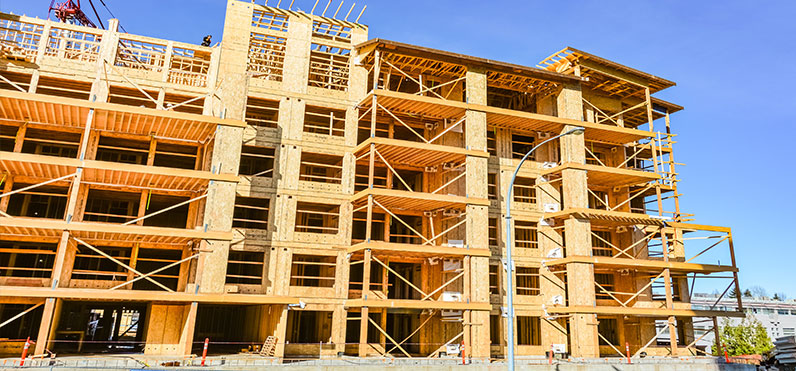On November 3, the Supreme Judicial Court determined that the statute of repose is triggered in a phased condominium each time a new building is opened for use. The SJC upended a previous decision issued by the United States District Court for the District of Massachusetts, which had ruled that the statute of repose does not begin to run – with respect to a phased condominium – until the final phase is recorded.
The SJC upended a previous decision issued by the United States District Court for the District of Massachusetts, which had ruled that the statute of repose does not begin to run – with respect to a phased condominium – until the final phase is recorded.
The underlying case – D’Allessandro v. Lennar Hingham Holdings, LLC, No. 17-CV-12s567-IT (D. Mass.) – involves the Hewitts Landing Condominium, a development consisting of 28 two- and three-story buildings located on the harbor waters of Hewitts Cove, the former site of the Hingham Shipyard in Hingham, Massachusetts. The project was planned as a “phased condominium” where the developer – Lennar Northeast Urban (“Lennar”) – would build 150 units over the course of twenty-four phases of construction between 2008 and 2015. “Phasing of a condominium permits a developer to expand the size and scope of a condominium project in response to market conditions. In a phased condominium development, groups or stages of units are completed over a period of several years and become part of the condominium by successive amendments to the master deed. ‘Phasing’ is not a statutory term, but is a usage that has grown out of the general enabling provisions of G.L. c. 183A.” Queler v. Skowron, 438 Mass. 304, 312 n.15 (2002) quoting Podell v. Lahn, 38 Mass.App.Ct. 688, 689 n.3 (1995).
The condominium trust initiated the lawsuit seeking to recover damages related to certain alleged widespread deficiencies in the design and construction of the common areas and facilities of the condominium. The alleged construction deficiencies included claims of deficient flashing that led to water infiltration, as well as claims that many of the 58 decks throughout the development were not properly affixed to their respective buildings. Lennar – in a motion for summary judgment – contended that the condominium trust’s claims were partially time barred under the statute of repose.
The statute of repose provides, in pertinent part, that “in no event shall [an action arising out of any deficiency in the construction of an improvement to real property] be commenced more than six years after the earlier of the dates of: (1) the opening of the improvement to use; or (2) substantial completion of the improvement and the taking of possession for occupancy by the owner.” M.G.L. c. 260, § 2B. Simply put, most of an association’s construction defect claims are absolutely time barred six years from the date that construction of a condominium is completed. Lennar contended that the statute of repose began to run – for each of the 24 phases of the condominium – when the project architect issued certifications of substantial completion and/or when the Town of Hingham issued certificates of occupancy when the units, buildings, and other common elements in the condominium were completed respectively. In light of the fact that six of the twenty-eight condominium buildings were substantially complete more than six years prior to the trust’s initiation of the lawsuit, Lennar argued that the claims involving those buildings should be time barred.
The condominium trust countered that the “improvement” to real property was not 150 different subprojects relating to the individual units – or even twenty-eight different subprojects relating to the individual buildings – but rather one endeavor to build a single condominium development. As such, the trust argued, the statute of repose should not begin to run for the common areas of the condominium until the entire condominium development – not just the portions of the condominium – was completed. The United States District Court agreed with the condominium trust (See USDC's Memo on Summary Judgment). The USDC reasoned that “Since Lennar saw this continuous project through from start to finish, the practical concerns about the availability of witnesses and evidence are not implicated in the same manner as they would have been if different general contractors had completed discrete portions of the project more than six years before this action was filed.” In sum, the USDC found that – at least with respect to the specific facts at issue in the Lennar case – the construction of a portion of a condominium project cannot constitute completion of an improvement for triggering the statute of repose period while the overall project remains underway.
Upon the USDC’s certification of two (2) questions to the MA Supreme Judicial Court regarding the application of the Statute of Repose to multi-building developments, the SJC disagreed, disregarding the pragmatic approach employed by the USDC, and concentrated its focus almost exclusively on the plain language of G.L. c. 260, § 2B. The SJC, in D’Allessandro v. Lennar Hingham Holdings, LLC, SJC-12891 – seized upon two factors contained within the statute: (1) whether the improvement is open to use, and (2) whether the improvement is substantially complete and the owner has taken possession for occupancy. Limiting its analysis to these factors, the SJC concluded that the issuance of a certificate of occupancy effectively triggered the statute of repose. As such, the SJC concluded that each time a particular building at a condominium received a certificate of occupancy, the repose period would begin to run.
The SJC curtly acknowledged that its ruling may present some difficulties for condominium associations at phased condominiums where the developer retains control of the association for a period of time after some (or all) of the buildings are completed. Despite seemingly recognizing the unequal burden posed by G.L. c. 260, § 2B to the unique form of condominium ownership, the SJC effectively punted this consideration to the legislature.
Notwithstanding the body blow delivered to associations at phased condominiums, the SJC seemingly tossed these associations a bone – holding that “where a particular improvement is integral to and intended to serve multiple buildings within a single phase, or buildings across multiple phases, or even the condominium development as a whole, the statute of repose begins to run when that discrete improvement is substantially complete and open to its intended use.” While this concession appears advantageous on its face, it will likely be difficult for associations to avail themselves of any benefit. Indeed, elements such as roadways, stormwater management systems, site grading and the like do not always receive municipal approvals – like a building receiving a certificate of occupancy. Establishing the specific dates when such elements are “substantially complete and open for [their] intended use” could prove exceedingly difficult for board members.
Furthermore, while the SJC answered the certified question posed by the District Court, it ultimately recognized that this issue should be appropriately addressed by the legislature. Fortunately, CAI New England has proposed a bill (currently known as H.4605) which seeks to establish, among other things, that a limitation period for a condominium construction defect claim shall not begin to run until the substantial completion of all phases of the condominium. H.4605 has passed the MA House of Representatives, but was sent back to the MA Senate for it to either pass the bill or provide further comments. It is expected that CAI New England and REBA will be seeking to move H.4605 along before the end of the current legislative session. However, because most legislation on Beacon Hill has been stalled due COVID-19, in the event H.4605 does not get to the Governor’s desk by the end of this year, it is expected that this Bill be refiled in the next session which commences in January 2021.
The development of condominiums in phases is a practice commonly employed by developers. In light of the SJC’s ruling, associations dealing with construction deficiencies will now be required to file a lawsuit each time a particular phase is nearing the expiration of the repose period. Indeed, an obligation has been created for those organizations of unit owners to pursue piecemeal litigation while construction of the condominium is ongoing.
Tom Moriarty and Kimberly Bielan of MBM filed an amicus briefs on behalf of the Real Estate Bar Association for Massachusetts, Inc., and the Abstract Club in order to support the proposition that the statute of repose should not begin to run for the common areas of the condominium until the entire condominium development has been completed.


